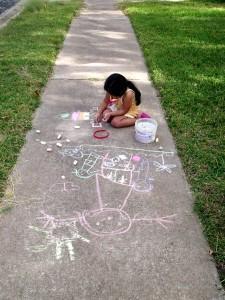The following article comes from the Summer 2014 issue of Episcopal Teacher, a publication of the Center for the Ministry of Teaching.
Children are on a mission: God is working in, through and with them. What is our role as parents – or caregivers in any capacity? How do we celebrate their noticings, attend when they are joyous or sorrowful, and offer creative paths from boredom into engagement?
Listening to Children
Listening comes first: fully listening to the child – not distracted by our busy schedules and mobile devices. It helps for us to be thinking in terms of of leading questions that engage, instead of just seeking the right answer. For example, “What do you think about that?”
Encouraging Noticings
The ride we regularly take in the car or on public transportation can become an opportunity for seeing new things or seeing things anew. I spy something red. How many red things can you find? (Might be a woman’s handbag. Could be a book that boy is carrying.) How many signs can we find that have a zero in them? How many dogs – or flowers, or black shoes – can we spot?
Have an assortment of “what was the ___ thing that happened to you today?” (Fill in the blanks with: funniest, silliest, best, happiest, etc.) Invite each child to add what they noticed.
Creating Stories
One person starts with something like: “Once upon a time there was a…” with each person adding their own ideas as the story unfolds. It probably won’t be the next great American novel, but the activity draws out creativity. No matter how silly the story becomes, in can make a long ride or a hot afternoon more fun.
Make up a Song
Maybe it is “Thank you, God, for this fine day.” Pick a tune and together add more words. Or, agree on a tune from an advertisement you all know and make up new words to go with it. I know a family that sings to the tune of “Amazing Grace,” especially if things are a bit dicey (pouring rain, running late for an appointment, or hot tempers).
Staying with Sadness
Sad happens. Rushing on past it will not make it go away. The sadness may be huge -the death of someone we love. It might be something that is simply too big for the moment: a friend is leaving our circle, for whatever reason. Or just simply sad: I did not make the soccer team.
Staying with sadness – working through it – takes courage. Courage grows with affirmation: It is okay to be sad. Courage is shattered by shame, so we need to be on guard to keep shame out of the work at hand.
We can also be attentive to questions about God’s place in tragedy. “No, God did not do this.” We can encourage the child to consider what God might be thinking all this. Do we suppose God just might be sad, too?
Coping with Anger
Since punching an offender is not an acceptable option, we need to discover ways to process anger, and show this to children. Someone cut us off in traffic, for example. Some possible responses: What might that person have been thinking? What was so dangerous about that person’s action? Where do we imagine that person is going in such a hurry? What could we think up to pray about for that person?
Maybe a child in our care is angry about something huge or manageable. Helping the child own the anger – What happened, How does it feel, What am I able to do – helps him or her let go of the anger.
Choosing Forgiveness
We migth start by reminding children about some things that forgiveness is not:
- To forgive is not to say what happened is OK.
- To forgive does not mean the whole thing is forgotten.
- To forgive does not mean all the hurt has gone away.
Forgiveness is hard. But forgiving gets YOU unstuck. Forgiveness lets you put down the burden. Forgiveness means ‘making everything all right’ is not my job. How would you describe how it feels to be able to forgive someone?
Claiming an Attitude of Gratitude
Our expressions of gratefulness from the little (“Yeah! the bus is on time!”) to bigger things (“The brakes held: I could stop in time! Thank you, God!”) enlarge our capacity to receive joy. A gratitude circle can be staged anywhere: Each person simply names one thing she or he is grateful for. Helping children notice the things that make them want to say, “Thank you, God!” may be the greatest gift we can give our children.
Helen Barron offers resources for families with young children through Candle Press.

